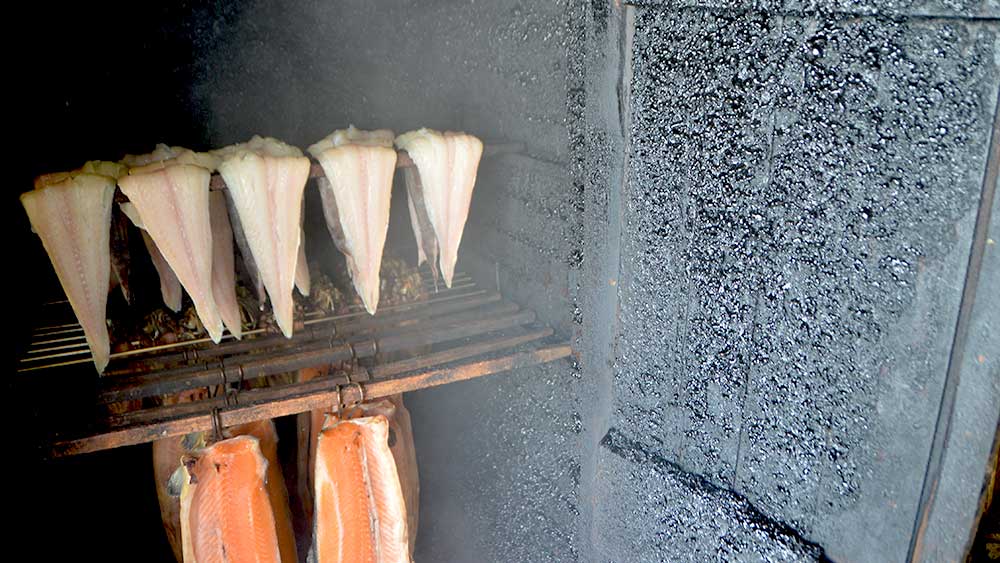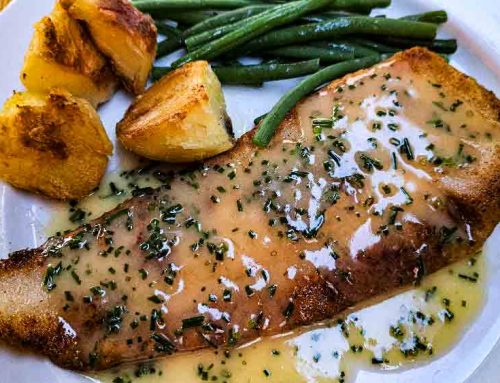This Cullen skink recipe is for a very traditional thick Scottish soup made of smoked haddock, potatoes and onions. It is full of comforting ingredients, plenty of flavour, along with some rich cream making it perfect for the colder shorter days of the year. It has a delicate flavour, and the smoked haddock gives it a distinctive warming aroma. This is a perfect dish for Burns Night making a great fishy alternative to a Haggis.
Traditional Scottish Fish Soup
This famous recipe is originally from Cullen in northeast Scotland a fishing village on the Moray Firth where haddock has long been a major part of the catch. The “skink” part of the name comes from an old Scottish term for soup. Older recipes for Cullen skink from north of the border will call for a “finnan haddie”, but it may be prepared with any other un-dyed smoked fish – such and the Haddock Walter Purkis cure in their Crouch End shop smoke house will be just right.
Local Smoked Haddock
In our Crouch End smokehouse we use the traditional method of smoking which requires the fish being suspended over slow burning or smoldering wood shavings. The fish are left hanging for many hours to be naturally infused with smoke. The fish is high above the burning wood so that it is kept cool during the smoking process. We use traditional skills and recipes that have been handed down through the family for at least six generations. More about our smokehouse here >>
As with any traditional dishes there are many different variations, adaptations and schools of thought. It is hard to say this is “the” authentic recipe however the version below has all the familiar ingredients cooked together making a delicious soup (or skink) without any contemporary additions.
In you don’t fancy Haggis for Burns night on the 25th of January but would like some traditional Scottish fare; then this Cullen Skink recipe is a delicious fishy alternative.
This recipe will serve 4 to 6 people – depending whether this is a main course, light lunch or starter
Ingredients for Cullen Skink recipe
500g un-dyed smoked haddock from Walter Purkis and Sons
Two Bay leaves
25g of butter
1 Medium onion chopped finely
1 leek, washed and cut into chunks discard dark green sections of the leaf.
2 medium potatoes (about 400g), peeled and diced
I pint (500ml) whole milk
Chives, chopped, to serve
Cooking method for Cullen Skink recipe
Place the fish in a pan that is big enough to allow the haddock to lie flat skin side down – add half the butter and cover with the milk. Add the bay leaves and bring gently to the boil. By the time it comes to the boil, the fish should be just cooked, if not leave for a few more minutes in the milk with the pan off the heat.
Remove fish from the pan, separate and discard the skin and any bones, break up into large flakes and set aside to cool. Reserve the cooking liquid.
Melt the remaining butter in a pan on a low heat, and add the onion and the leek. Cover and allow to soften without browning (which might detract from the pale colour of the final dish)
Next add the diced potato to the softened vegetables. Stir them around the pan so that they are also are coated in the butter. Return the reserved the haddock cooking liquor to the pan and bring to a very gentle simmer. Cook until the potato is tender.
Once the the potato is cooked there need to be a mixing of the ingredients. Add the haddock flakes to the pan and allow it to warm for a few minutes. Next take out a generous slotted spoonful of potatoes fish and leeks set aside to be returned to the soup when served. Mash or blend the remaining ingredients
Season to taste then serve each bowl with a generous spoonful of the potato, leek and haddock mixture in each bowl A good sprinkling of chopped chives will add a fresh note to the flavours and make a pleasing colour contrast enhancing your presentation.
Some versions of the recipe include the addition of sweet corn in the final stages when the potato is cooked this will add a complementary flavour and visual interest. It makes for a smokey and more robust version of an american chowder.






